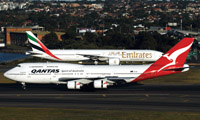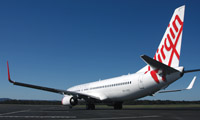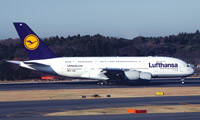Cover Story
SHIFTING SANDS
New airline alliances, as well as several innovative partnerships between carriers, are an increasing threat to big Asian hubs as they re-shape traditional air routes between Australasia and Europe. At the same time, a once unthinkable commercial relationship between struggling Qantas Airways and the Gulf’s Emirates Airline moves closer to fruition
September 1st 2012
Around 18 months ago, Dr Tony Webber was sitting in a car with then Qantas frequent flyer chief, Simon Hickey, discussing the loss-making problems of the airline’s mainline international business. By the time the journey had ended, Hickey, who became head of the Australian carrier’s international arm last May, and Webber, then Qantas’s chief economist, came to the same conclusion: the carrier should to be sold. Read More »
 |
| A partnership between once rivals Qantas Airways and Emirates Airline could be only months away |
In reality, that was hardly an option. With a US$250 million loss in its 2010-11 financial year and another $472.9 million deficit in the year just ended June 30, the struggling international operation won’t make Qantas shareholders happy anytime soon.
Hickey has a mountain to climb. Whichever way you look at it, profitability is likely to take several years to achieve.
It’s an open secret that Qantas is working behind the scenes to forge a partnership with previously bitter rival Emirates Airline. It’s a significant development. But while it may save Qantas’ own bacon, it could be a serious blow to some of Asia’s primary transit points, particularly Singapore.
Talk of the threat from fast expanding Gulf airports for Asian hubs is nothing new, but the changes afoot on the lucrative Kangaroo Route between London and Australia takes the competitive situation to a new level.
More than ever, Qantas’ chief executive, Alan Joyce, is under pressure to turn the fortunes of his airline’s international arm around as the old order of the famous long-haul route collapses.
 |
| 'I believe [an Emirates investment in Qantas] is the way forward for them in terms of profitably expanding their business' |
| Dr Tony Webber Managing Director Webber Quantitative Consulting and former Qantas chief economist |
He has implemented a recovery plan that includes splitting its divisions into separate businesses with their own chief executives, route rationalization and a drive to cut more cost and increase efficiency. He has also announced job cuts of 2,800 from the 32,500 strong workforce. All of this is expected to take more than two years to produce positive results.
Both Qantas and Emirates have confirmed they are talking about a major code-share arrangement. Sources say the result will involve Qantas switching the bulk of its Kangaroo Route traffic between London and Australia from Singapore to the Middle East. In partnership with Emirates, Qantas will offer travellers one-stop flights into destinations throughout Europe.
Qantas only flies through Singapore to London and Frankfurt. Passengers endure two stops if they want to go anywhere else on the continent. It has dumped European operations from Bangkok and Hong Kong, handing on passengers at these destinations to oneworld alliance partner, British Airways.
Webber, who has left Qantas and is managing director of Webber Quantitative Consulting, as well as an associate professor at the University of Sydney Business School, believes that Qantas, once it establishes a partnership with Emirates, will ditch Frankfurt.
He predicted Qantas would continue to operate to London via Singapore, although his own view is that it should halt operations on that route too. “They [Qantas] doesn’t need to look for other partners through Singapore. Emirates flies to 31 points in Europe so they only need one single code-share with one of the biggest players in the Middle East. If they can land Emirates, that solves a lot of their difficulties,” said Webber.
According to one source close to the talks, the Emirates tie-up “is not a matter of if, but when”.
And that’s not the only cloud on Singapore Changi International Airport’s horizon. Its business is under a pincer attack from the Gulf to the west and from China to the north. Fast expanding China Southern Airlines (CSA), which launched its Canton Route from Sydney to its Guangzhou base and onto London, with three weekly flights, earlier this year, will increase the route to daily next month.
 |
| Virgin Australia: Australian government approved an increase in shareholding of Abu Dhabi-based Etihad Airways from 4.99% to 10% |
Later in the year, it will upgrade the services from A330s to B787s. Next year it is likely to put A380s on the route. It plans to more than double its Australian services by 2015.
At a press conference in Guangzhou last month, announcing new services to Brisbane, CSA president and chief executive, Tan Wangeng, said the airline was heavily promoting the Canton Route as an alternative to other Kangaroo Route hubs, traditional stopover bases such as Singapore, Hong Kong and Bangkok, as well as the Middle East.
And Tan made no secret about his desire for an alliance with Qantas, which works closely with Shanghai-based China Eastern Airlines, and Virgin Australia.
“CSA would be very happy to cooperate with Qantas and Virgin. I am looking for the perfect opportunity to meet with my Australian counterparts and talk about the possibility. If Australian airlines are interested in working with China Southern it would be very beneficial for them,” he said.
The focus of long-haul flying for Australian carriers has well and truly shifted to the Middle East. Virgin Australia is in bed with Abu Dhabi-based Etihad Airways, which in July was given the green light by the Australian Government to double its equity stake in Virgin from 4.99% to 10%.
The carriers have a multi-tiered partnership, which includes code-sharing, joint marketing and reciprocal earn-and-burn on their respective frequent flier programmes. Together, Etihad and Virgin operate 24 flights a week between Australia and Abu Dhabi, offering Australian travellers access to a combined network of more than 285 global destinations.
 |
| Qantas Airways chief executive, Alan Joyce: his carrier is facing a “triple whammy” |
The increased shareholding was approved despite protests from Qantas that it could “go under” if Etihad was allowed a greater stake in its rival. It warned the Gulf carrier could bankroll a major attack on the lucrative Australian domestic market via Virgin.
Etihad chief executive, James Hogan, an Australian, said suggestions his airline wants to take control of Virgin were ridiculous. “We can’t run an Australian airline from Abu Dhabi, nor do we intend to,” he said. Virgin Australia’s major shareholder is Sir Richard Branson’s Virgin Group, which holds equity of 26%.
Hogan, who was in Australia last month to announce an increase in Etihad flights from Virgin’s base at Brisbane, said the investment was aimed at improving co-operation on routes and networks and create better economies of scale, as it is doing with airberlin, Ireland’s Aer Lingus and Air Seychelles, in which it also has equity.
He said the potential partnership between rival Emirates and Qantas would be a boon for the Middle East aviation sector. “It’s great for the Gulf carriers. The more people that fly through the Gulf the better,” said Hogan.
Confirmation of the Qantas-Emirates talks prompted industry rumours the Dubai-based operator was looking at taking equity in Qantas. This was immediately denied by Emirates.
Its chairman, Sheikh Ahmed bin Saeed al-Maktoum, told reporters: “The objective is to eventually see Qantas fly through Dubai. Talks are concentrated on a code-share arrangement. The deal is likely within six months. We are not discussing revenue sharing.”
Emirates chief executive, Tim Clark, added: “We are not at all buying a stake in Qantas.”
 |
| Lufthansa German Airlines: one of a number of airlines lobbying hard to stop Emirates being given more rights |
Despite these denials, former Qantas chief economist Webber strongly believes Emirates should consider an investment. “Definitely. I believe that’s the way forward for them in terms of profitably expanding their business instead of just buying more planes and sticking them on international routes,” he said.
“They have to be smarter about it and say OK this is fine in terms of expanding internationally, but we won’t make any money from the airline business doing that because no airline in the world makes money internationally.”
Webber said buying equity stakes in other airlines is “incredibly important” for the Gulf carriers because they don’t have their own domestic markets.
“It’s easier for them to buy equity stakes or to enter into code-share agreements to get access to domestic markets. Etihad realized that some time ago when they bought into airberlin and Aer Lingus and acquired access to intra-European traffic,” he said.
“Emirates is just cottoning on to the fact that the fastest growing and most profitable aviation markets in the world are generally domestic, particularly outside Europe, where there’s no mode-of-transport competition.
“They have suddenly realized ‘we need to start buying equity stakes in airlines so we at least get an indirect exposure to domestic markets and increase our code-share and interline arrangements’.”
As for the prospective deal with Emirates, Webber said the benefits would be enormous for Qantas. “Emirates has lower unit variable costs than Qantas. On the Dubai to Europe leg of the trip, which will be operated by Emirates, unit variable costs will be lower, which in turn could be passed through into lower prices,” he said.
 |
| 'We can’t run an Australian airline from Abu Dhabi, nor do we intend to' |
| James Hogan Chief Executive Etihad Airways |
“Dubai Airport is likely to have lower airport charges than Asia. Lower airport charges paid by Qantas for the Australia to Dubai leg flow into lower unit costs and prices for the leg.
“Emirates pays a lower rate of departure tax to the UK and German governments than Qantas because the tax is a positive function of the distance between the UK and Germany and the port where the aircraft first lands. As Dubai is closer to the UK and Germany than Singapore, Bangkok and Hong Kong, Emirates pays less tax than Qantas.
“This tax saving could be passed onto Qantas customers. If this deal goes ahead, it represents very exciting times for Qantas and its shareholders, who have not had much cheer in recent times.”
Webber said there are benefits for Emirates, which has been the target of endless complaints from Qantas.
“Emirates has some real difficulties in Western economies in relation to putting the noses of some of the national full-service airlines out of joint. Lufthansa, Air Canada, Air France, British Airways, as well as Qantas, have been lobbying really hard with their governments to stop Emirates being given more rights. They are starting to feel the pinch,” he said.
Getting together with Qantas not only means Emirates gains access to Qantas’s domestic network, but it also takes out a persistent antagonist. “No longer can Qantas turn to the Australian government and say lots of nasty things about it,” said Webber.
Qantas boss Joyce, who last month announced he won’t take any bonus or pay rise this year, said opening new global hubs would be a cornerstone in the airline’s recovery.
“Qantas International has been hit by the post-GFC [global financial crisis] triple whammy; high fuel prices, the high Australian dollar and the economic downturn in major markets like Britain, Europe and the United States,” he said.
He also listed three more direct challenges; “our high legacy cost base, our end-of-the-line geography and our small population”.
| 'If Australian airlines are interested in working with China Southern it would be very beneficial for them' |
| Tan Wangeng President & Chief Executive China Southern Airlines |
In clear reference to the Gulf, which is not served by Qantas, he said one of the solutions remains the development of en-route gateways or “large hub airports” which Qantas flies into and other airlines exit.
“They can pull in travellers from all over the world and send them on to their final destinations. For Qantas these hubs would mean extending our reach while restraining our costs,” said Joyce.
None of this means Qantas will abandon Changi. It may lessen its importance as a gateway to Europe, but Singapore remains a key hub for its Asian operations. Its budget carrier, Jetstar Asia, is based there and the mainline carrier would still want to feed traffic from Australia onto its fast-growing regional network, which now includes Jetstar Pacific in Vietnam and Jetstar Japan, with plans to launch a Jetstar Hong Kong.
Jetstars operates 520 of the more than 6,200 weekly flights to and from Changi, four times more than Qantas’s 130 weekly flights. On a visit to Singapore recently, Joyce said: “Changi needs Qantas and Qantas needs Changi. It’s a good partnership.”
Joyce plays down the potential importance of an Emirates deal in relation to Singapore. “When you look at the traffic flows into Europe there is a huge amount of competition on the Kangaroo Route,” he said. “Over 30 airlines are operating through various destinations. There are people that go over Japan, over China, over traditional Asian countries like Singapore, Thailand and Malaysia and there are people that go over the Middle East.
“People use whatever options are there. I wouldn’t say it is a significant trend change. The issue is that it just gets to be a more and more competitive environment.”
Everyone agrees turning around Qantas’s international business presents a massive challenge, but Webber believes Hickey can achieve it. He said there were two critical problems, the oil price and low yields. They can’t get yields up because there’s too much capacity in the market,” he said.
In the medium term, Webber said Qantas had to get its capacity right. “You have got to get your capacity growth right in a high fuel price environment. And you’ve got to get the allocation of that capacity right.”
Webber said Qantas needed to cut long-haul operations on price-sensitive segments. “You can still do your ultra-long flying even in a high fuel environment, as long as you can increase your yields to compensate for the higher unit costs,” he said.
“But you’ll only be able to get your yields up if you have a demographic on that plane that is not as sensitive to price. What [Qantas] will probably need to do in the long term, if there is a permanently high oil price, is change the configuration of its aircraft so there is less of a premium mix.
On average, about 16% of Qantas seats are first, business and premium economy. They will need to reduce that to lower the unit costs and bump up the yields on the planes. They will also need to get more fuel efficient aircraft.”